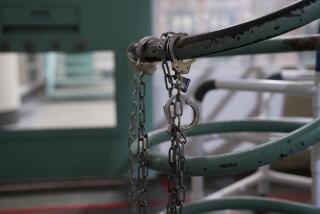Judge opens inquiry into California prison death
SACRAMENTO -- A federal judge Thursday agreed to hear evidence in the death of a California prison inmate who, while on suicide watch, was pepper sprayed by guards because he refused to remove his hands from his cell door.
The inmate relied on a breathing tube, which he removed after being sprayed, and he died some eight hours later in what prison officials initially ruled a potential suicide, corrections reports show. The man’s parents have accused prison officials of attempting a cover-up in the case, an allegation California prison officials adamantly deny.
Joseph Duran, 35, died Sept. 7, two days after arriving at Mule Creek State Prison. His death came shortly before U.S. District Judge Lawrence Karlton held hearings over California’s use of pepper spray on mentally ill inmates, which included weeks of testimony.
According to family members and court records filed by the state, Duran was on suicide watch within a prison psychiatric unit when he disobeyed orders to remove his hands from a food slot in his door. He was then pepper sprayed by guards.
According to family members who said they received a confidential copy of a prison report detailing the incident, Duran removed his breathing tube -- he had had a tracheotomy -- and eight hours later, with the tube still removed, was found dead in his cell.
The corrections department, in legal filings, contends “the connection between [Duran’s] exposure to pepper spray and his death is speculative.”
The Amador County coroner’s office determined Duran’s death was a suicide, and that he died by asphyxiation.
State lawyers say the death initially was investigated as a potential suicide, but two doctors who reviewed the case file for the prison agency considered it to be accidental.
Lawyers representing state prison inmates say the state hid the case from them during the pepper spray hearings, while presenting experts who testified pepper spray causes no lasting physical harm and is safer than other methods to control unruly prisoners.
They, and Duran’s family, say they did not become aware of Duran’s death until January, when they were contacted by reporters for the Sacramento Bee inquiring about the case.
Lawyers for the state on Thursday told Karlton they were willing to discuss details of Duran’s death privately, and brought California’s top prison officials with them to court to do that.
“The department has taken this inmate’s death extremely seriously from the beginning,” said Patrick McKinney with the state attorney general’s office.
Karlton refused the offer and advised McKinney to take the corrections department’s explanations “with caution.”
Karlton has allowed 30 days for lawyers who represent some 33,000 mentally ill prisoners in California to gather information on Duran’s death.
paige.stjohn@latimes.com
Twitter: @paigestjohn
More to Read
Start your day right
Sign up for Essential California for news, features and recommendations from the L.A. Times and beyond in your inbox six days a week.
You may occasionally receive promotional content from the Los Angeles Times.







